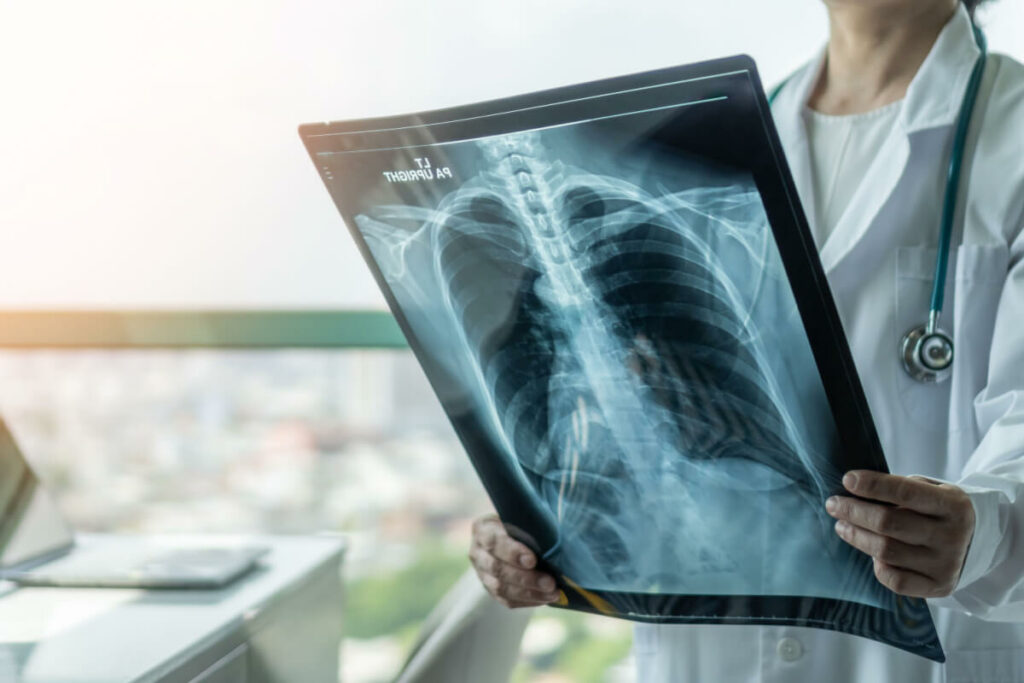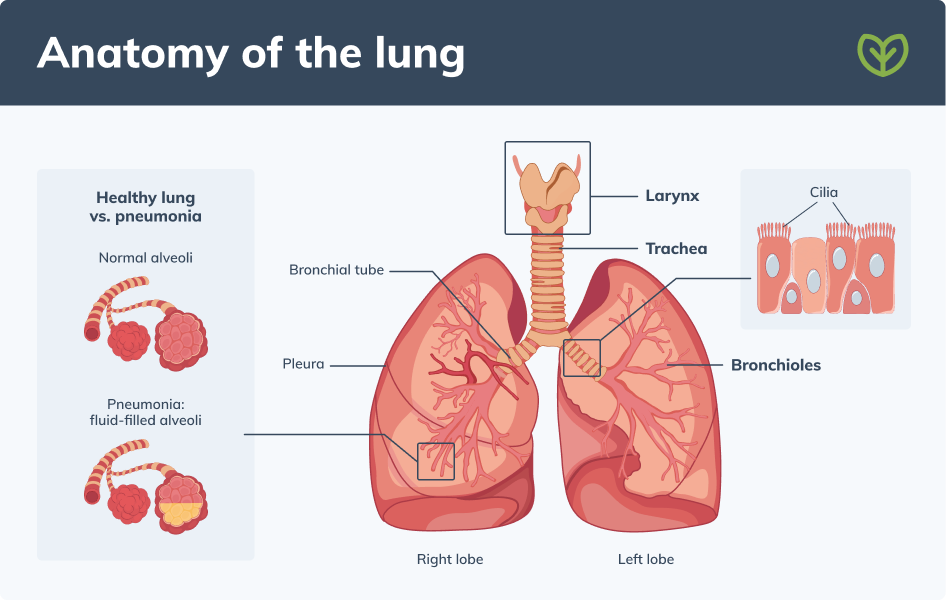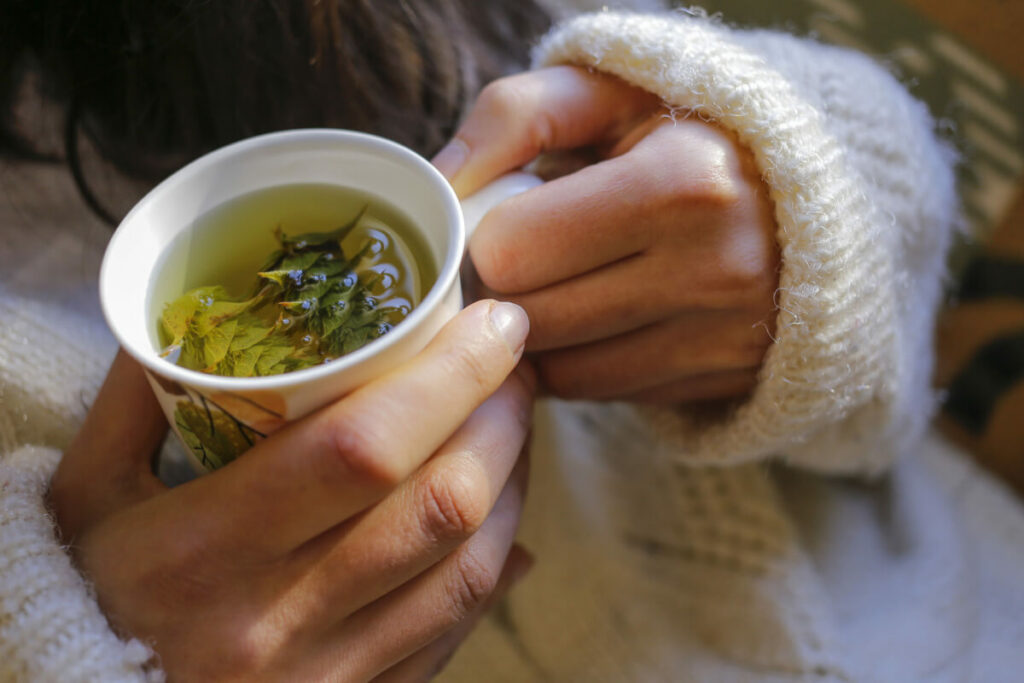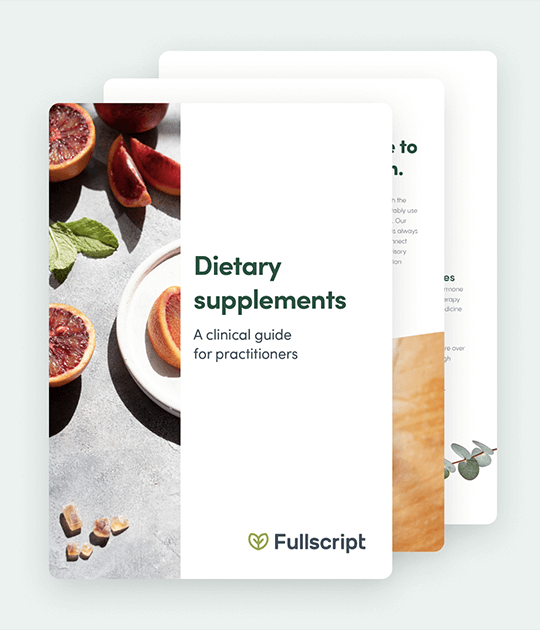According to the Centers for Disease Control and Prevention (CDC), emergency rooms treated 1.5 million Americans for pneumonia in 2018 alone. (24) While pneumonia is a fairly common lung infection, it can be extremely serious and even deadly. In fact, the World Health Organization reports that pneumonia is among the deadliest communicable diseases and ranks as the fourth leading cause of death globally. (35) Fortunately, not all cases are severe and mild to moderate cases can often be managed at home. Continue reading to learn about natural treatment for pneumonia.
Did you know? More children under the age of five die from pneumonia than from any other infectious disease. (24)

What is pneumonia?
Pneumonia is an inflammatory infection that can affect one or both lungs. (4) It causes the air sacs in the lungs (alveoli) to become inflamed and fill with fluid or pus. (5) Most cases of pneumonia are caused by bacteria or viruses, and can be a complication of infections like a cold or the flu. (16)

There are a number of different types of pneumonia, but most cases fall into one of four categories: bacterial, viral, walking, and aspiration.
Bacterial pneumonia
Most cases of pneumonia are caused by bacteria, especially one type of bacteria called Streptococcus pneumoniae. Other types of bacteria implicated in pneumonia also include Haemophilus influenzae and Mycoplasma pneumoniae. (25) This type of pneumonia is traditionally treated with antibiotics. (29) Although bacterial pneumonia can affect people at any age, those with a weakened immune system or those with habits like smoking, heavy alcohol use, or a poor diet that can put them at greater risk are more vulnerable to this form of the disease. (22)(25)
Viral pneumonia
Viral pneumonia is another common type of the disease, especially in people with diminished immunity. Like bacterial pneumonia, it can be either community-acquired (meaning you get it in a community setting like school or work) or hospital-acquired (meaning it’s an infection you get in a hospital or other healthcare setting while being treated for another condition). Although more than 20 different viruses have been linked to community-acquired viral pneumonia, the flu is the most prevalent cause. (5) Because this type of pneumonia is viral, antibiotics aren’t effective and may contribute to antibiotic resistance. (10) Determining the difference between viral and bacterial pneumonia often requires a culture that checks respiratory secretions for viral antigens. (5)
Walking pneumonia
This is the mildest form of bacterial pneumonia—so mild that it’s often mistaken for the common cold. Technically known as atypical pneumonia, it’s caused by the bacterium Mycoplasma pneumoniae. (20) Like other types of bacterial pneumonia, walking pneumonia can be treated with antibiotics, so it’s important to see your doctor if you are experiencing symptoms. (34)
Aspiration pneumonia
Aspiration pneumonia can occur when food, saliva, liquids, or vomit is inhaled into the lungs instead of traveling to the stomach. People most at risk for this type of pneumonia include individuals who:
- Drink or take drugs in excess
- Have a seizure disorder
- Have difficulty swallowing or coughing
- Reside in nursing homes
- Were given general anesthesia (3)
Because aspiration pneumonia is bacterial in nature, it is treated with antibiotics. (21)
Is pneumonia contagious?
Because most cases of pneumonia are caused by a bacteria or virus, the disease is often contagious and can be passed through coughs and sneezes. You may also be exposed by touching an object that is contaminated with the germs, then touching your mouth or nose. (14)
Pneumonia symptoms
Depending on the underlying cause of the infection and your health status, symptoms can range from mild to severe. They can include:
- Chills
- Confusion, especially in older people
- Cough, which may produce green or yellow mucus
- Fatigue
- Fever, which can be as high as 105℉ (40.5℃)
- Loss of appetite
- Nausea and vomiting
- Rapid shallow breathing
- Sharp or stabbing pain when you breathe deeply or cough
- Shortness of breath (26)

Pneumonia risk factors
Anyone can “catch” pneumonia, but your odds increase if you have one or more of the following risk factors:
- Age, especially in those under age 2 or over age 65
- Alcohol overuse
- Chronic health conditions like heart disease or diabetes
- Current or recent hospital stay
- Environmental exposure to some chemicals or pollutants
- Pre-existing respiratory conditions like asthma, chronic obstructive pulmonary disease (COPD) or cystic fibrosis
- Recreational drug use
- Recent viral infection like a cold or the flu
- Smoking and exposure to secondhand smoke
- Weakened immune system (16)(23)(25)
Preventing pneumonia
Preventing pneumonia entails many of the same strategies you would rely on to avoid other contagious illnesses. These include washing your hands, eating a varied and healthful diet, exercising, and keeping your immune system healthy. (23)
Download a guide on immune health to learn more about how to keep your immune system healthy.
Certain practitioners may recommend that some people—especially smokers, people living with a chronic disease, and those over the age of 65—get a pneumonia vaccine. Currently, there are two vaccines available. While vaccination won’t prevent all pneumonia, it has been shown to reduce the severity and duration of the disease. (23) Because the flu is often a forerunner of pneumonia, especially in the elderly, doctors may also recommend an annual flu vaccine. (11) If despite your best efforts, you wind up with pneumonia, it’s important to see your health care practitioner as soon as possible. They will prescribe treatment based on the underlying cause of your pneumonia (i.e., bacterial or viral). (13)

Natural treatment for pneumonia
Most cases of community-acquired pneumonia can be treated at home. The American Lung Association recommends the following tips to help you feel better as you heal:
- Control your fever with ibuprofen, naproxen, or acetaminophen.
- Drink plenty of fluids to help loosen secretions and bring up phlegm.
- Drink warm tea and soups.
- Take steamy baths and use a humidifier to help open your airways and ease your breathing.
- Avoid air pollution and smoke, including cigarette smoke, secondhand smoke, and wood smoke.
- Get lots of rest. It’s important not to overdo daily activities until you are fully recovered. (13)
Did you know? If you have pneumonia, drinking green tea or some herbal teas like ginger or peppermint can provide powerful antibacterial and antiviral benefits. (9) They may also help to open airways, ease lung congestion, and reduce inflammation. (18)(28)
Dietary supplements for pneumonia
In addition to medication, research reports that there are some supplemental strategies you can employ to ease symptoms and possibly even speed healing. However, before taking any supplements for pneumonia, it’s wise to check with your healthcare provider, especially if your treatment plan includes an antibiotic or antiviral medication.
1. Coenzyme Q10
Well known for supporting cellular energy, coenzyme Q10 (CoQ10) has also been found to inhibit inflammation, modulate oxidative stress, and speed healing in those with pneumonia. (12) In one study of older people hospitalized with the disease, those given supplemental CoQ10 in addition to their regular treatment experienced a faster resolution of their fever and a shorter hospital stay than those given a placebo. (6)
2. Echinacea
Echinacea is an antibacterial herb that stimulates immunity while also keeping the immune system from overreacting. (36) A review of six clinical trials involving nearly 2,500 people found that the herb also helped to prevent repeated respiratory infections and the complications of pneumonia. (30)
3. N-acetylcysteine
N-acetylcysteine, or NAC, is a precursor to glutathione, often called the “master antioxidant,” and a powerful antioxidant on its own. Taken as a supplement, emerging evidence suggests that NAC could reduce lung damage in pneumonia patients by decreasing free radical damage and keeping inflammation in check. (8)(37)
4. Probiotics
Supplementing with probiotics may help reduce symptoms and improve outcomes. This was seen in one Canadian study of hospitalized patients with pneumonia. Those who received a probiotic supplement containing Lactobacillus rhamnosus GG had a reduced risk of a severe type of pneumonia that can occur after being on a ventilator. (4) Another study of 80 people with pneumonia found that adding probiotics containing B. subtilis and S. faecium strains to antibiotic therapy lowered fever and improved overall symptoms faster than antibiotics alone. Supplementing with probiotics also normalized inflammatory markers, suggesting that it may help reduce inflammation in the lungs. (17)
5. Vitamin D
Research notes that a deficiency in this critical nutrient can leave you more vulnerable to community-acquired pneumonia. (22) However, studies suggest that supplementing with vitamin D may provide some protection against pneumonia and other respiratory infections. If you do find yourself with a case of pneumonia, adequate vitamin D levels may reduce the severity of your infection. (38) To ensure you’re getting enough, it’s wise to take a daily vitamin D supplement. Ask your healthcare provider to test your levels to check for a deficiency and determine the appropriate dose.
6. Zinc
Zinc plays an important role in maintaining a strong immune response, (33) so it’s no surprise that reduced levels increase the risk of developing pneumonia. This was shown during a year-long study of nursing home patients. Those with lower zinc levels were nearly twice as likely to contract the disease as those with normal levels. (19)
Supplementing with zinc doesn’t just help prevent pneumonia, some studies suggest that it may also reduce the duration and severity of the disease. (1)(27)(32) However, not all studies have found a benefit to taking supplemental zinc if you already have pneumonia. (7) If you do choose to take a zinc supplement, discuss it with your doctor first as this mineral can interact with certain antibiotics. (39)
The bottom line
Pneumonia is a very common yet potentially serious lung infection. Frequently caused by bacteria or a virus, people over age 65 and under age 2 are especially vulnerable to the disease. While it’s important to seek medical attention, many cases can be managed at home with rest, fluids, and other strategies to naturally relieve symptoms. Some herbs and nutrients have also been clinically shown to help ease symptoms and accelerate healing.
- Acevedo-Murillo, J.A., García León, M.L., Firo-Reyes, V., Santiago-Cordova, J.L., Gonzalez-Rodriguez, A.P., Wong-Chew, R.M. (2019) Zinc supplementation promotes a Th1 response and improves clinical symptoms in fewer hours in children with pneumonia younger than 5 years old. A randomized controlled clinical trial. Frontiers in Pediatrics, 7, 431.
- Assimakopoulos, S.F., Aretha, D., Komninos, D., Dimitropoulou, D., Lagadinou, M., Leonidou, L., Oikonomou, I., … Marangos, M. (2021). N-acetyl-cysteine reduces the risk for mechanical ventilation and mortality in patients with COVID-19 pneumonia: a two-center retrospective cohort study. Infectious Disease (London), 53(11):847-854.
- Berger, S.C. (2021). An introduction to aspiration pneumonia. U.S. Pharmacist, 46(7), HS1-HS6.
- Cook, D.J., Johnstone, J., Marshall, J.C., Lauzier, F., Thabane, L., Mehta, S., Dodek, P.M., … PROSPECT Investigators and the Canadian Critical Care Trials Group (2016). Probiotics: Prevention of severe pneumonia and endotracheal colonization Trial-PROSPECT: A pilot trial. Trials, 17, 377.
- Dandachi, D. & Rodriguez-Barradas, M.C. Viral pneumonia: Etiologies and treatment. Journal of Investigative Medicine, 66(6), 957-965.
- Farazi, A., Sofian, M., Jabbariasl, M. & Nayebzadeh, B. (2014). Coenzyme q10 administration in community-acquired pneumonia in the elderly. Iranian Red Crescent Medical Journal, 16(12), e18852.
- Fataki, M.R., Kisenge, R.R., Sudfeld, C.R., Aboud, S., Okuma, J., Mehta, S., Spiegelman, D., & Fawzi, W.W. (2014). Effect of zinc supplementation on duration of hospitalization in Tanzanian children presenting with acute pneumonia. Journal of Tropical Pediatrics, 60(2), 104–111.
- Grant, W.B., Lahore, H., McDonnell, S.L., Baggerly, C.A., French, C.B., Aliano, J.L., & Bhattoa, H.P. (2020). Evidence that vitamin D supplementation could reduce risk of influenza and COVID-19. Nutrients, 12, 988.
- Hacioglu, M., Dosler, S., Birteksoz Tan, A. S., & Otuk, G. (2017). Antimicrobial activities of widely consumed herbal teas, alone or in combination with antibiotics: an in vitro study. PeerJ, 5, e3467.
- Heneghan, C. & Pluddemann, A. (2020). Differentiating viral from bacterial pneumonia. The Centre for Evidence-Based Medicine. https://www.cebm.net/covid-19/differentiating-viral-from-bacterial-pneumonia/
- Heo, J.Y., Song, J.Y., Noh, J.Y., Choi, M.J., Yoon, J.G., Lee, S.N., Cheong, H.J., & Kim, W.J. (2018). Effects of influenza immunization on pneumonia in the elderly. Human Vaccines & Immunotherapeutics, 14(3), 744–749.
- Hernández-Camacho, J. D., Bernier, M., López-Lluch, G., & Navas, P. (2018). Coenzyme Q10 supplementation in aging and disease. Frontiers in Physiology, 9, 44.
- How is pneumonia treated? (2021). American Lung Association. https://www.lung.org/lung-health-diseases/lung-disease-lookup/pneumonia/treatment-and-recovery
- Is pneumonia contagious? (2019). National Health Services. https://www.nhs.uk/common-health-questions/infections/is-pneumonia-contagious/
- Kim, G.L., Seon, S.H. & Rhee, D.K. (2017). Pneumonia and Streptococcus pneumoniae vaccine. Archives of Pharmacal Research, 40(8), 885–893.
- Learn about pneumonia. (2020). American Lung Association. https://www.lung.org/lung-health-diseases/lung-disease-lookup/pneumonia/learn-about-pneumonia
- Lee, C.H., Choi, Y., Seo, S.Y., Kim, S.H., Kim, I.H., Kim, S.W., Lee, S.T., & Lee, S.O. (2021). Addition of probiotics to antibiotics improves the clinical course of pneumonia in young people without comorbidities: A randomized controlled trial. Scientific Reports, 11(1), 926.
- McKay. D.L. & Blumberg, J.B. (2006). A review of the bioactivity and potential health benefits of peppermint tea (Mentha piperita L.). Phytotherapy Research, 20(8), 619-33.
- Meydani, S.N., Barnett, J.B., Dallal, G.E., Fine, B.C., Jacques, P.F., Leka, L.S. & Hamer, D. H. (2007). Serum zinc and pneumonia in nursing home elderly. The American Journal of Clinical Nutrition, 86(4), 1167–1173.
- Miyashita, N. (2022). Atypical pneumonia: Pathophysiology, diagnosis, and treatment. Respiratory Investigation, 60(1), 56-67.
- Ott, S.R. & Lode, H. (2006). Diagnosis and therapy of aspiration pneumonia. Dtsch Med Wochenschr, 131(12), 624-8. German.
- Pneumonia. (2021). Medline Plus. https://medlineplus.gov/pneumonia.html
- Pneumonia. National Heart, Lung, and Blood Institute. https://www.nhlbi.nih.gov/health/pneumonia
- Pneumonia in children statistics. (2019). UNICEF data. https://data.unicef.org/topic/child-health/pneumonia/
- Pneumonia: overview. (2018). InformedHealth.org. https://www.ncbi.nlm.nih.gov/books/NBK525774/
- Pneumonia symptoms and diagnosis. (2021). American Lung Association. https://www.lung.org/lung-health-diseases/lung-disease-lookup/pneumonia/symptoms-and-diagnosis
- Qasemzadeh, M.J., Fathi, M., Tashvighi, M., Gharehbeglou, M., Yadollah-Damavandi, S., Parsa, Y. & Rahimi, E. (2014). The Effect of Adjuvant Zinc Therapy on Recovery from Pneumonia in Hospitalized Children: A Double-Blind Randomized Controlled Trial. Scientifica, 2014, 694193.
- Rondanelli, M., Fossari, F., Vecchio, V., Gasparri, C., Peroni, G., Spadaccini, D., Riva, A., Petrangolini, G., Iannello, G., Nichetti, M., Infantino, V., & Perna, S. (2020). Clinical trials on pain lowering effect of ginger: A narrative review. Phytotherapy research : PTR, 34(11), 2843–2856.
- Sattar, S.B.A. & Sharma. S. (2021). Bacterial Pneumonia. In: StatPearls. Treasure Island (FL): StatPearls Publishing. https://www.ncbi.nlm.nih.gov/books/NBK513321/
- Schapowal, A., Klein, P., & Johnston, S.L. (2015). Echinacea reduces the risk of recurrent respiratory tract infections and complications: a meta-analysis of randomized controlled trials. Advanced Therapeutics, 32(3), 187-200.
- Torres, A., Cilloniz, C., Niederman, M.S., Menéndez, R., Chalmers, J.D., Wunderink, R.G., & van der Poll, T. (2021). Pneumonia. Nature Reviews: Disease Primers, 7(1), 25.
- Wadhwa, N., Chandran, A., Aneja, S., Lodha, R., Kabra, S.K., Chaturvedi, M.K., Sodhi, J., … Bhatnagar, S. (2013). Efficacy of zinc given as an adjunct in the treatment of severe and very severe pneumonia in hospitalized children 2-24 mo of age: A randomized, double-blind, placebo-controlled trial. American Journal of Clinical Nutrition, 97(6),1387-94.
- Wessels, I., Maywald, M., & Rink, L. (2017). Zinc as a gatekeeper of immune function. Nutrients, 9(12), 1286.
- What is walking pneumonia? (2017). American Lung Association. https://www.lung.org/blog/what-is-walking-pneumonia
- WHO reveals leading causes of death and disability worldwide: 2000-2019. (2020). World Health Organization. https://www.who.int/news/item/09-12-2020-who-reveals-leading-causes-of-death-and-disability-worldwide-2000-2019
- Zhai, Z., Liu, Y., Wu, L., Senchina, D. S., Wurtele, E. S., Murphy, P. A., Kohut, M. L., & Cunnick, J. E. (2007). Enhancement of innate and adaptive immune functions by multiple Echinacea species. Journal of Medicinal Food, 10(3), 423–434.
- Zhang, Q., Ju, Y., Ma, Y., & Wang, T. (2018). N-acetylcysteine improves oxidative stress and inflammatory response in patients with community acquired pneumonia: A randomized controlled trial. Medicine, 97(45), e13087.
- Zhou, Y.F., Luo, B.A., & Qin, L.L. (2019). The association between vitamin D deficiency and community-acquired pneumonia: A meta-analysis of observational studies. Medicine, 98(38), e17252.
- Zinc. (2021). National Institutes of Health, Office of Dietary Supplements. https://ods.od.nih.gov/factsheets/Zinc-HealthProfessional/






